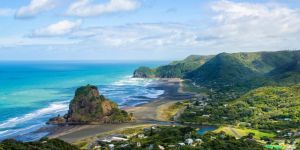
Auckland is a city brimming with university students, both local and international. There are two leading universities in Auckland that are covered in this article, but also a range of technical institutes and other tertiary organizations. If you are interested in going to New Zealand as an international student or moving there with an aim to study in the future, find out what to expect below.
Universities in Auckland
University of Auckland
The University of Auckland began as Auckland University College, part of the now-defunct University of New Zealand, on 23 May 1883. In 1961, Auckland University College became the University of Auckland and has since grown exponentially, currently spanning five campuses throughout Auckland and hosting around 45,000 students.
The University of Auckland is New Zealand's largest and highest-ranked university. Its QS World University Ranking is 68, making it the only New Zealand university in the top 100. It is known in the city as the most academically prestigious, with fantastic engineering and business programs, as well as a wide variety of courses across the spectrum of learning. Thanks to a new government scheme, international Ph.D. students pay the same tuition rates as New Zealand students. Of its 45,000 students, around 5,000 are international, representing more than 110 different countries.
If you plan to attend the University of Auckland as an undergraduate, you will need the appropriate secondary school qualifications, and you must meet their English language requirements. If you would like to do a postgraduate program, you will need to have a completed undergraduate degree with good academic grades. For more information on specific program entry criteria, check the university's website.
Auckland University of Technology
Auckland University of Technology (AUT) is a newer, fully accredited school with three campuses across the city of Auckland and state-of-the-art facilities for its students. The education at AUT uses a modern approach that is very real-world focused, giving students practical skills to take with them upon graduating.
AUT is currently ranked first in New Zealand for research impact and health subjects and is in the top 25 in the world for international outlook. It is known for its high level of student support and has an excellent reputation for communications studies and law, but it offers a wide range of courses.
AUT is very accommodating to aspiring international students – they offer English language and foundation courses for you to take if you do not currently hold the necessary qualifications for entry into a degree program. Once you successfully complete these classes, you can then begin your chosen course.
Other study options in Auckland
Other options for international students in Auckland include:
- Massey University: This university has a large campus in Auckland, offering a range of programs in subjects such as business, health sciences, engineering, and humanities.
- Auckland Institute of Studies: This private institute offers a range of programs in areas such as business, hospitality, tourism, and IT.
- The University of Waikato - Auckland Campus: This university, based in Hamilton, has a satellite campus in Auckland offering a range of programs in subjects such as business, computer science, and education.
- Auckland University of Technology - School of Business: This is a subsidiary of AUT, specializing in business-related programs and offering a range of business degrees, diplomas, and certificates.
- Unitec New Zealand: This institute is one of the largest providers of applied technical education in New Zealand, offering a range of programs in areas such as engineering, construction, and creative technologies.
- MIT (Manukau Institute of Technology): This institute offers a range of programs in areas such as engineering, health sciences, creative arts, and business.
Auckland university fees, enrolment, and other useful information
In general, undergraduate fees start at about NZ$6,000 for domestic students and about NZ$30,000 for international students. For postgraduate courses, expect about NZ$8,000 for domestic students and NZ$40,000 for international students.
It's also important to note that domestic students in New Zealand are eligible for a government-funded student loan, which can cover their tuition fees and living costs. Additionally, some domestic students may be eligible for their first year of tuition to be paid for by the government under certain conditions. However, it's best to check with the relevant government agency for up-to-date information on eligibility and the application process.
Universities may differ slightly, but in general, the New Zealand academic year begins in late February/early March and runs until November, with a break in July. December and January are summer in New Zealand and serve as either the summer break or summer school term. Most prospective students will have an application deadline in December before their start date. However, this varies depending on programs and application requirements. You also may want to apply well in advance to ensure enough time to obtain your New Zealand student visa and plan your travel to a new country.
Opportunities for international students
There are several scholarships and financial aid options available for international students attending university in Auckland, New Zealand. It is recommended to check with individual universities and organizations for a complete list of available scholarships and eligibility criteria, as funding and programs are subject to change.
- University of Auckland International Student Scholarships: The University of Auckland offers a range of scholarships for international students, including the International Student Excellence Scholarship, the International Student Accommodation Scholarship, and the International Student Scholarship.
- Auckland University of Technology International Student Scholarships: Auckland University of Technology (AUT) offers a range of scholarships for international students, including the AUT International Excellence Scholarship and the AUT International Doctoral Scholarship.
- Massey University International Student Scholarships: Massey University offers a range of scholarships for international students, including the International Excellence Scholarship and the Massey University Doctoral Scholarship.
- New Zealand International Doctoral Research Scholarship: This scholarship is available to international students who are undertaking a Ph.D. at a New Zealand university, including those in Auckland.
- Fulbright New Zealand Scholarships: The Fulbright program offers a range of scholarships for international students to study and research in New Zealand, including in Auckland.
Visas for international students in New Zealand
International students are required to have a valid visa for the entire duration of their studies within New Zealand. Your university will ask to see your visa documents before they enroll you, and if this is not provided, you will not be allowed to attend. Most schools will assist you with visa information and applications if you need guidance. All student visa information can be found on the Immigration New Zealand website. Options will depend on your nationality, age, financing, and length of study.
As an international student in New Zealand, there are a few things to be aware of regarding student visas:
- Eligibility: To be eligible for a student visa in New Zealand, you must have been accepted into a full-time course at a New Zealand institution and have sufficient financial support to cover your tuition fees and living expenses.
- Duration of study: Your student visa will generally be valid for the duration of your study program, plus a few months to allow you to prepare for your departure from New Zealand.
- Work rights: International students in New Zealand are generally allowed to work part-time while they are studying, but there are some restrictions on the number of hours they can work each week. It's best to check with the New Zealand immigration authorities for up-to-date information on work rights for international students.
- Health insurance: International students are required to have comprehensive health insurance for the duration of their stay in New Zealand. This can be provided through a government-sponsored insurance scheme or through a private insurance provider.
- Compliance with conditions: International students must comply with the conditions of their student visa, including attending their course and maintaining a full-time course load. Failure to comply with these conditions can result in the cancellation of their student visa.
- Renewal: If you need to extend your student visa, you will need to apply for a renewal before your current visa expires. It's important to start the renewal process well in advance to ensure that your visa is processed in time.
Student life in Auckland
While Auckland isn't a 'student city' as such, it does have a thriving student subculture. Many locals tend to live at home while they study, but you will find pockets of suburbs filled with student flats. Kingsland, Grey Lynn, and Parnell are some examples where you will find big old houses converted into long-running student flats.
As an international student in Auckland, there are a few important things to be aware of when studying in the country, including the following:
- Maori culture: New Zealand has a rich and vibrant Maori culture that is an important part of the country's identity and heritage. As an international student, it's important to be respectful of Maori customs, traditions and protocols and to make an effort to learn about Maori culture. You may have the opportunity to attend a traditional Maori performance, such as a haka, or to visit a marae, a communal meeting place that is central to Maori culture.
- Study requirements: Make sure you are aware of the academic requirements of your course, including attendance and assessment expectations, and make sure you have a solid understanding of the English language if you are studying in Auckland.
- Living expenses: Auckland is a relatively expensive city to live in, especially for international students, so it's important to budget for living expenses, such as food, housing, and transportation.
- Health and safety: Take care of your health and safety while in Auckland, including obtaining comprehensive health insurance and being aware of the local emergency services.
- Social opportunities: Make the most of the social and cultural opportunities available to you as an international student in Auckland, including joining clubs and societies, attending events, and exploring the country's unique landscapes and attractions.
We do our best to provide accurate and up to date information. However, if you have noticed any inaccuracies in this article, please let us know in the comments section below.












Comments